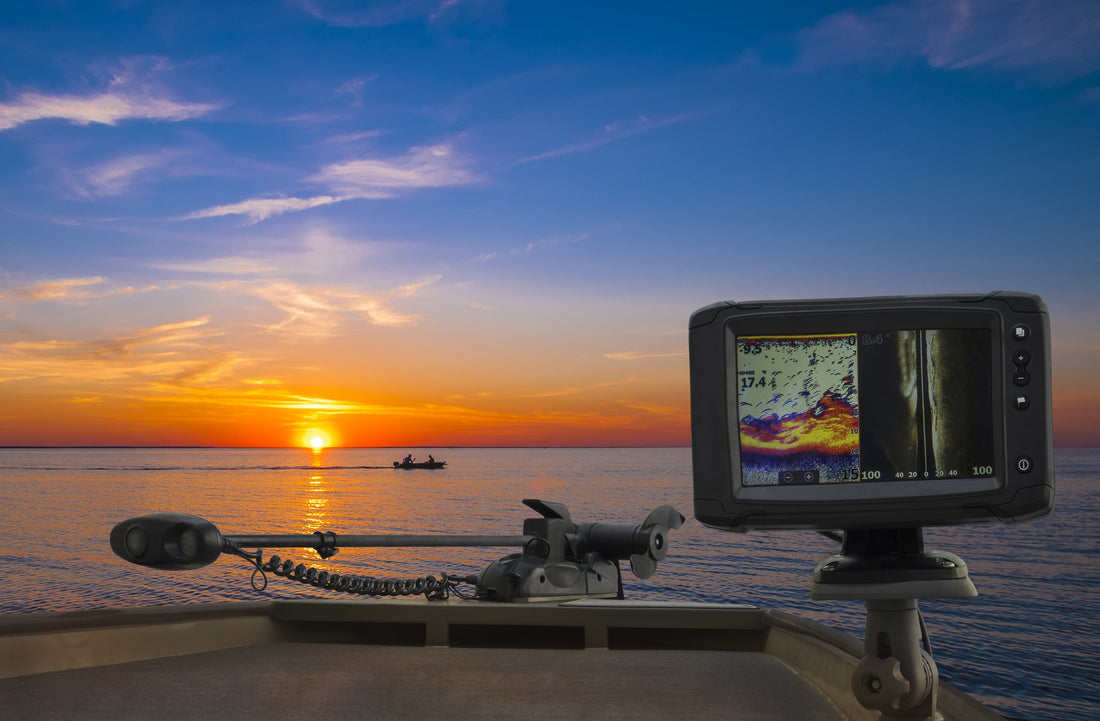Now that you’ve discovered the joys of fishing from a kayak, you can maximize your catch with a fish finder. There is so much tech available today to help you navigate your way to where the fish are biting.
Do you need a fish finder?
Whether or not you use a fish finder, it is still very important to learn your sport. An attentive angler is a successful angler. With or without a fish finder, there are some tips to being in the right place at the right time.
- Check the slope - Many times you can understand the lay of the land with just thenaked eye. Does the bottom gradually drop off or gently descend? Oftentimes the shore slope continues into the water, so a steep/vertical bluff adjacent to the water will probably continue under water.
- Cast at an angle - Don’t cast directly perpendicular to the shoreline. In order to cover various depths, cast at an angle so that you hit varying depths as you reel back in.
- Learn from the birds - Another way to find where the fish are is to watch where the birds are feeding. Using your eyes and ears can reveal where fish are moving and feeding. Are there birds diving? Do you see bait fish jumping to escape larger predators? Did you hear that bass behind you take down a frog?
However, today’s fish finders are useful for so many reasons:
- Of course, they can help you find fish! You can locate schools of bait fish or pursue the depths for feeding fish.
- Many also allow you to locate and easily return to favorite fishing spots.
- They can map the bottom to help you locate and return to underwater structures and avoid dangerous terrain.
- And even if you don’t use it to find your fish, your fish finder with GPS can help you quickly and safely return to your launch.
What do you need for a fish finder?
If you decide that a fish finder is right for you, there are a couple of things to consider with your kayak. Some kayaks come ready for a fish finder, while others need a little adaptation.
- Mount display: Fish finder displays can come in a range of sizes from as small as a few inches to a large as 12+ inches. A five-seven inch display is a decent size for kayak fishing as it allows you to see the screen but isn’t so large that it gets in the way. Mount your display in reach but out of the way.
Some modern fishing kayaks come with flat areas and gear racks that are already installed at the more popular locations for displays. You can also invest in adjustable arms that allow you to move the display out of the way when not in use.
On a pedal kayak, you might want the mount close to the seat. However, if you are paddling, you might want to mount the display out of the way of the center of the kayak.
Placing the mount close to a deck hatch or scupper will make it easier to run wires to the battery and transducer. Check out any of the Brooklyn Kayak Company PK series for a good kayak to install a fishfinder: BKC PK 11, BKC PK 12, BKC PK 13, BKC PK 14.
- Place the battery: One downside of adding electronics to your kayak is the weight of your battery. Make sure that your kayak can support this. A fish finder usually requires at least a 10 amp hour battery. Lead acid batteries are heavier but cheaper. Lithium ion batteries weigh less but cost more.
Battery placement should be inside the hull, near the seat, and on the centerline of the kayak for best weight distribution. In a best-case scenario, wires can be run through the hatch. Otherwise, use a through-hull grommet to thread the wire from display to battery.
The Brooklyn Kayak Company solo angler kayak BKC RA220 is perfect for installing a fish finder, as is the Brooklyn Kayak Company BKC TK122.
- Install the transducer: The transducer is the device that sends out the signal, so it is important that it is installed correctly. Kayak hulls are often thin enough that this device can sit flush to the bottom and send a signal through it. Installing it ahead of the cockpit reduces pedal or paddle interference.
Getting a kayak with hatches, scuppers, and such makes this process easier, so you can connect all the pieces of the fish finder without having to drill into the kayak itself.
Other innovative anglers have installed their display, battery, and transducer together on a special base that fits into a gear track. This allows the battery and display to stay in the yak while an arm dangles the transducer over the side and into the water. Advantages include being fully removable for storage and thief prevention, good for forward seeing sonar, and less invasive on a kayak (no need to drill holes).
Brooklyn Kayak Company offers the BKC FK285 that offer gear tracks and hatches.
Choosing the right kayak can go a long way to making your angling dreams a reality. Brooklyn Kayak Company has so many great fishing kayak options that will make installing a fish finder a breeze. While it can’t make the fish bite, it can increase your chances of success.

